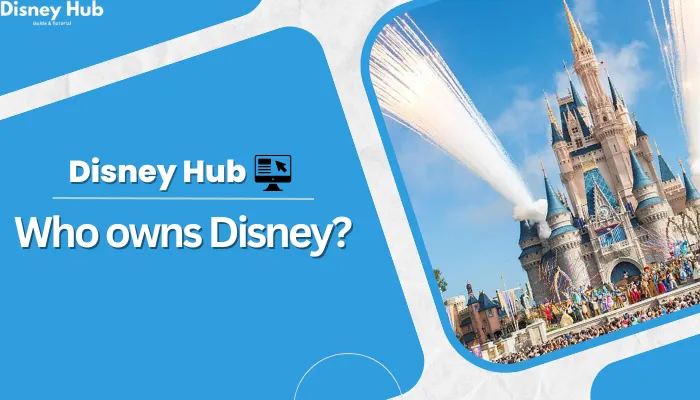Who owns Disney? This entertainment industry titan has enthralled audiences for generations. From Mickey Mouse to Marvel superheroes, the magic of Disney touches all corners of the earth. But behind this facade is a web of ownership that determines what direction it takes.
This article examines Who Owns Disney? with a focus on its public ownership structure, key players and what the future might hold for Disney’s corporate ownership.

The Walt Disney Company
A Brief History of Disney:
Walt Disney and his brother Roy O. Disney founded The Walt Disney Company in 1923. Originally an animation studio, today it is a global company involved in film production, theme parks, consumer goods etc.
Importance of Understanding Disney’s Ownership Structure:
Understanding who owns the company is important for several reasons including showing how decisions are made within the organization and revealing other financial factors affecting this giant entertainment firm.
A Publicly Traded Company:
Disney’s Listing on Stock Exchanges:
The NYSE (New York Stock Exchange) lists shares of The Walt Disney Company under the DIS symbol because the company is publicly traded.
Public Ownership: A Multitude of Shareholders:
By being publically listed; many shareholders have differing sizes of stakes in it which can be divided into two categories as explained below:
- Institutional Investors: These are large financial firms like investment companies, pension funds and mutual funds.
- Individual Shareholders: They comprise individual retail investors who buy stocks directly or through various investment vehicles.
Institutional Investors
Analysis of Institutional Ownership:
The majority stake at Walt Disney is held by institutional investors who have a significant say on where the company goes next.
Influence of Institutional Investors:
They give priority to profitability and shareholder value which can affect creative choices and strategic decisions.
Examples of Major Institutional Investors:
- The Vanguard Group
- BlackRock Inc.
- State Street Corporation
These corporate giants own a major chunk of Disney stocks thereby influencing the company’s overall ownership structure.
Who Holds the Most Stock?
Overview of Major Shareholders:
Despite institutional investors owning most of its shares, there are also individual shareholders as well as families who control sizable interest therein.
Notable Individuals and Families:
- The Disney family itself has had a long association with the company.
- People who have been CEO or held other high-ranking positions in Disney.
Impact of Key Shareholders:
Based on their stake size and vision for the future direction of the entity, these people may take part in vital resolutions about it.
The Disney Family:
History of the Disney Family’s Involvement:
Since its inception, Walt Disney himself together with his offspring has impacted heavily on this organization.
Current Status of Disney Family Ownership:
Their proportion has reduced over time but they remain involved to some extent.
Influence of the Disney Family on Disney’s Operations:
The present-day operations at Walt Disney Company continue to be influenced by its founders’ legacy and guiding principles.
The Role of CEO and Executive Leadership
CEO’s Impact on Company Direction:
The CEO plays a crucial role in shaping the company’s strategic vision and making major decisions that influence Disney’s future.
Alignment of Leadership with Shareholder Interests:
Ideally, therefore, both the company leadership and shareholders’ interests should be aligned with the CEO’s choices.
Regulatory Considerations
Legal Framework Governing Ownership:
Antitrust legislation tries to avoid monopoly power from one firm taking control of an entire industry thus playing an important part in how Disney is owned.
Antitrust Concerns and Regulatory Oversight:
To ensure that competition is not hindered within the entertainment industry regulators take a close look at Disney’s ownership spaces.
Implications of Ownership Limits on Disney’s Structure:
Some certain acquisitions or partnerships can be influenced by limitations to ownership.
Challenges and Controversies
Corporate Governance Issues:
However, it can become difficult to balance different stakeholders’ interests as well as uphold ethical corporate practices.
Shareholder Activism and Resolutions:
Resolutions and activism may allow shareholders to bring about changes within the organization.
Controversies Surrounding Disney’s Ownership Structure:
Sometimes there may be disputes due to complications emanating from ownership webs in decision-making processes or conflicting roles/literary conflicts.
What Lies Ahead for Disney’s Ownership?
Potential Changes in Ownership Landscape:
Disney has had different owners over time because it has undergone various shifts such as mergers, acquisitions or even stock market trends.
Impact of Emerging Trends:
For instance, if streaming services continue growing or new forms of media consumption emerge then this could affect who owns shares in the company like Disney.
Predictions for Disney’s Ownership Structure in the Coming Years:
It is hard to predict what will happen to Disney’s ownership in the future. However, several scenarios may occur including:
- Increased influence of institutional investors with a focus on short-term gains.
- Potential for activist shareholders to push for changes in the company’s direction.
- The Disney family potentially retains a symbolic presence on the board, even with a diminished ownership stake.
Understanding the Importance of Ownership
Recap of Key Points Regarding Disney’s Ownership:
- This essay is meant to give an overview of ownership matters relating to Disney studios.
- The largest part of this organization’s shares lies with institutional inventors but also individuals and some members of the Walt Disney family have shares in it (p.23).
- The CEO being at the top and having control of all activities within an organization has a great impact on business operations (Author Surname).
- Regulation concerns or controversies around this issue exist about who owns Disney entities.
Importance of Understanding Ownership for Stakeholders:
All employees, investors, fans and critics must understand where Disney stands as far as its ownership is concerned. This information casts light on what could be happening behind closed doors thereby helping interested groups find insight into how decisions are made by their leaders.
Final Thoughts on Who owns Disney?
Disney Company reflects the complex environment through which the entertainment industry operates. As we proceed along, however, it remains intriguing to ask who exactly directs the strings behind such magic; because as always, there lie significant implications for whatever comes ahead (p).
